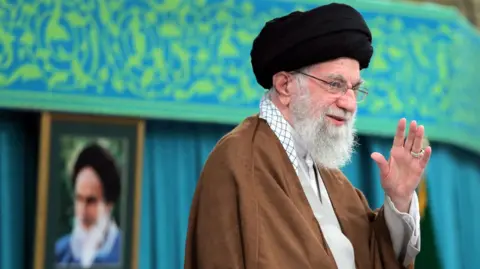Iran’s Response to Israeli Strikes: Caution and Calls for Restraint Amid Rising Tensions
In response to recent Israeli airstrikes that reportedly targeted military sites across Iran, Iran’s Supreme Leader, Ali Khamenei, urged restraint, stating that the attacks should neither be “exaggerated nor downplayed.” This cautious approach contrasts with past rhetoric and seems aimed at balancing national resolve with a desire to avoid escalation.
Key Details of the Incident
Iranian President Masoud Pezeshkian asserted that Iran would respond “appropriately” to the attacks, which left at least four Iranian soldiers dead. However, Pezeshkian clarified that Tehran does not seek to engage in open conflict. Israeli officials confirmed their actions as retaliation for a barrage of almost 200 missiles fired toward Israel on October 1, claiming their strikes “severely damaged” Iran’s missile capabilities.
Strategic Tone from Iranian Leadership
Khamenei’s comments took on a notably reserved tone, delegating responsibility to other authorities, a significant shift from his past direct threats. Analysts suggest this could be a strategic move, allowing Iranian officials flexibility in determining any retaliatory actions.
President Pezeshkian echoed Khamenei’s message, reinforcing that while Iran is committed to defending its national interests, it remains cautious about triggering further hostilities.
 Reuters
ReutersReactions from Israel
Israeli Prime Minister Benjamin Netanyahu stated that Israel’s strikes were both “precise and powerful,” achieving their intended objectives of damaging Iranian air defense and missile production systems. Emphasizing Israel’s stance on deterrence, Netanyahu asserted, “whoever hurts us, we hurt him,” at a commemorative event.
Context and Wider Regional Implications
The Israeli strikes were reportedly narrower than some anticipated, as the U.S. had advised Israel not to target oil or nuclear facilities. In a related development, Iran’s Foreign Minister revealed that Iran received indications of an imminent attack hours prior, though no further details were provided.
Meanwhile, fighting persists across the region, with hostilities reported between Israel and Hezbollah in Lebanon, as well as between Israel and Hamas in Gaza. Israeli airstrikes in southern Lebanon reportedly resulted in casualties, while an attack on a Gaza refugee camp led to further loss of life.
Ceasefire Proposal and Response
Egyptian President Abdel Fattah al-Sisi recently proposed a two-day ceasefire in Gaza, involving an exchange of Israeli hostages for Palestinian prisoners. However, Hamas has reiterated its stance, demanding a complete Israeli withdrawal from Gaza and substantial prisoner exchanges before agreeing to any ceasefire terms.
Conclusion
As tensions remain high, both Iran and Israel continue to navigate a complex geopolitical landscape, with Western nations calling for restraint to prevent escalation. This latest exchange underscores the ongoing volatility in the region and the delicate balance that regional powers must maintain to avoid a full-scale conflict.
Note: This article draws on events and insights reported by BBC News Source link


